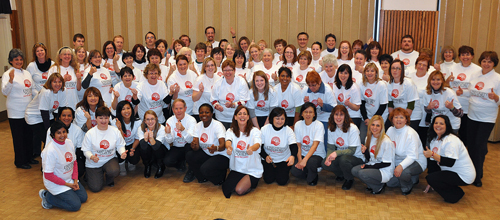
Here’s a trivia question: How many years has U of G held a United Way fundraising drive?
The correct answer is 50 years. The University of Guelph was incorporated in May 1964, and when faculty and staff volunteers canvassed the campus that October, they raised $8,801 for the Guelph United Appeal, a precursor to today’s United Way Guelph Wellington Dufferin.
U of G’s founding colleges may have participated as early as 1940 when volunteer agencies in the city first pooled their fundraising efforts through the Guelph Community Chest for War & Welfare Services.
“Supporting the local community is part of our institutional DNA,” says 2014 campus co-chair Rich Moccia, associate vice-president research, strategic partnerships.
The barcode to prove it includes an open letter printed in the University’s Oct. 4, 1965, News Bulletin. Signed by U of G’s first president, John MacLachlan, and all college deans, the letter begins:
“With our metamorphosis into the University of Guelph, we have entered into a new and closer relationship with the city of Guelph. Now, more than ever, it is incumbent on us to support worthwhile community projects. One of these is the United Appeal.”
“Those words still ring true today,” says Moccia. “I’ve lived in Guelph for 42 years and I know how important it is for the University to be part of the larger community in which it exists. As MacLachlan said, supporting the United Way is a great way to do that.”
From $8,801 in 1964 to $608,000 last year, U of G employees, retirees and students have increased their support for the United Way in step with the University’s expansion and the growing needs of the community. MacLachlan’s appeal asked the campus to support 14 organizations; the 2014 United Way campaign will support 86 social service programs at 53 agencies in Guelph and Wellington.
In 1974 the U of G community donated $32,500, $73,000 in 1984, $170,000 in 1994, and $348,000 in 2004.
“Each decade has seen a tremendous increase in generosity,” says Moccia. “This year’s United Way campaign has achieved $438,207 to date. We are behind the pace of giving seen last year but are confident that payroll donations and special events being held in the next two weeks will push us over our $600,000 goal.” He and campus co-chair Kim Best, graduate secretary in the Department of Biomedical Sciences, remind everyone on campus to make their donation by campaign close on Dec. 5.
Best stresses how much a donation to the United Way can accomplish. “For less than the price of one coffee — $2 per week for a year – you can:
- Give 15 young children and their parents the chance to attend a two-hour early literacy program offered by Action Read,
- Provide a holiday meal for 18 seniors through Meals on Wheels,
- Provide a summer swim pass for a local family, organized by the Community Resource Centre of North and Centre Wellington, or
- Arrange two visits to a custodial facility so an aftercare co-ordinator at the John Howard Society of Waterloo Wellington can help an inmate plan for reintegration into society.
“You’ll find many more ways that your gift can help on the Guelph Wellington United Way website,” adds Best.
Since 1971, the Guelph United Way has used social planning as a way to identify community needs and manage the distribution of funds. Today’s organization is focused on three key areas: helping kids reach their potential, finding ways to move people from poverty to possibility, and building strong communities.
“The United Way threads through every part of the social fabric in our community and our campus,” says Moccia. “Every U of G president since J.D. MacLachlan has encouraged the annual fundraising campaign, and the United Way has drawn volunteers from every department within the University. It’s all those people working together who maintain the culture of giving and volunteering for which our campus is known.
“It makes me proud just to think about the University’s role in the United Way for 50 plus years.”
[slideshow gallery_id=”18″]
Click here to watch a video conversation between United Way student co-chair Remy Marlatt and president Franco Vaccarino.